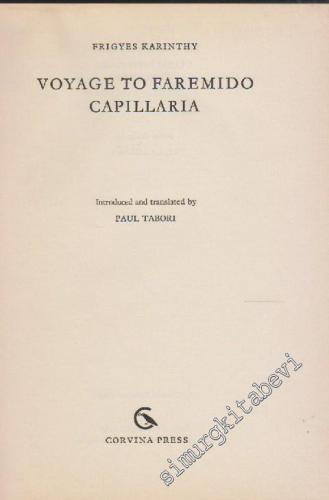
Voyage to Faremido 3
Capillaria 45
Frigyes Karinthy (1887-1938), humorist, poet, playwright, and essayist, was one of the most prolific and popular but also one of the most original and versatile Hungarian writers of his age. In the short novel VOYAGE TO FAREMIDO Karinthy presents a startlingly prophetic vision of a planet ruled by machines, the solasis whose language is music and who have achieved the utmost of automation and cybernetic superiority. Through the eyes of these inorganic and immortal beings, Man is only an unimportant and irritating rather than dangerous disease; an infestation, a parasitic germ. His wars, his ideals, his dreams and beliefs are ridiculously short-lived and unimportant. Yet the story is told without bitterness and pessimism. The Swiftian hero is only symbolic; Gulliver only serves as the spokesman of Karinthy's restless mind and scathing satire. Though the language is deliberately old-fashioned and mannered, the viewpoint and the conclusions of the book arc utterly contemporary and vividly valid. ‘How miraculous is the effect of music!' Karinthy writes in his epigraph. ‘As if someone pounded on the door of our soul from outside, from the world of Beauty and Reality; but we no longer understand the voice. It is this language they speak in Faremido. Gulliver, the wanderer, believed for a moment that he almost understood it. And that was when he wrote this book.' CAPILLARIA, the ‘eighth journey of Gullivér' presents with mordant humour and inexhaustible inventiveness the ancient ‘war of the sexes.' This country at the bottom of the sea is ruled by women, the dominant sex; and as the oihas are completely uninhibited, free from intellectual complexes, moral hesitations and collective responsibilities, their domination cannot be challenged by the thumb-sized bullpops, the Capillarian males. No misogynist, Karinthy strips away the illusions Man has created about the ‘female of the species' and the result is a disturbingly true and quite extraordinary book. Frigyes Karinthy (1887-1938) was born in Budapest to a poor but cultivated family. He published his first story, an imitation of Jules Verne, at the age of fifteen, and after briefly studying science and medicine at the University of Budapest, began work as a journalist while frequenting Budapest's burgeoning café society, eventually becoming an influential member of the circle associated with the pro-Western literary magazine Nyugat. That's How You Write, a collection of parodies of well-known writers that was one of five books that Karinthy published in 1912, established him as a popular comic writer. Karinthy wrote numerous novels, short stories, poems, and theatrical pieces and translated Gulliver's Travels and Winnie-the-Pooh. He also hoped to assemble a modern encyclopedia modeled on that of Diderot. His triumphant recovery from the illness described in A Journey Round My Skull was followed the next year by his death, while vacationing at a popular resort, of a stroke.
Voyage to Faremido 3
Capillaria 45
Frigyes Karinthy (1887-1938), humorist, poet, playwright, and essayist, was one of the most prolific and popular but also one of the most original and versatile Hungarian writers of his age. In the short novel VOYAGE TO FAREMIDO Karinthy presents a startlingly prophetic vision of a planet ruled by machines, the solasis whose language is music and who have achieved the utmost of automation and cybernetic superiority. Through the eyes of these inorganic and immortal beings, Man is only an unimportant and irritating rather than dangerous disease; an infestation, a parasitic germ. His wars, his ideals, his dreams and beliefs are ridiculously short-lived and unimportant. Yet the story is told without bitterness and pessimism. The Swiftian hero is only symbolic; Gulliver only serves as the spokesman of Karinthy's restless mind and scathing satire. Though the language is deliberately old-fashioned and mannered, the viewpoint and the conclusions of the book arc utterly contemporary and vividly valid. ‘How miraculous is the effect of music!' Karinthy writes in his epigraph. ‘As if someone pounded on the door of our soul from outside, from the world of Beauty and Reality; but we no longer understand the voice. It is this language they speak in Faremido. Gulliver, the wanderer, believed for a moment that he almost understood it. And that was when he wrote this book.' CAPILLARIA, the ‘eighth journey of Gullivér' presents with mordant humour and inexhaustible inventiveness the ancient ‘war of the sexes.' This country at the bottom of the sea is ruled by women, the dominant sex; and as the oihas are completely uninhibited, free from intellectual complexes, moral hesitations and collective responsibilities, their domination cannot be challenged by the thumb-sized bullpops, the Capillarian males. No misogynist, Karinthy strips away the illusions Man has created about the ‘female of the species' and the result is a disturbingly true and quite extraordinary book. Frigyes Karinthy (1887-1938) was born in Budapest to a poor but cultivated family. He published his first story, an imitation of Jules Verne, at the age of fifteen, and after briefly studying science and medicine at the University of Budapest, began work as a journalist while frequenting Budapest's burgeoning café society, eventually becoming an influential member of the circle associated with the pro-Western literary magazine Nyugat. That's How You Write, a collection of parodies of well-known writers that was one of five books that Karinthy published in 1912, established him as a popular comic writer. Karinthy wrote numerous novels, short stories, poems, and theatrical pieces and translated Gulliver's Travels and Winnie-the-Pooh. He also hoped to assemble a modern encyclopedia modeled on that of Diderot. His triumphant recovery from the illness described in A Journey Round My Skull was followed the next year by his death, while vacationing at a popular resort, of a stroke.














